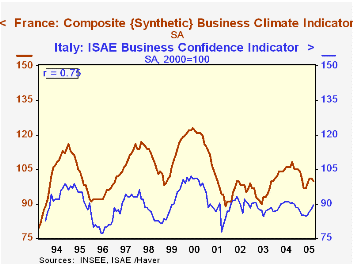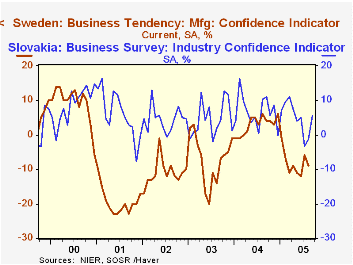 Global| Sep 28 2005
Global| Sep 28 2005Lackluster Expectations for European Business Managers
Summary
Business surveys for four European countries reported today for September and August show a largely stagnant picture for European companies. Signs of life that had appeared earlier seem to have dissipated. In France, for example, the [...]

Business surveys for four European countries reported today for September and August show a largely stagnant picture for European companies. Signs of life that had appeared earlier seem to have dissipated.
In France, for example, the INSEE synthetic climate indicator (a composite of current and expected production and order trends) sits at 100, an absolutely neutral result. Last year, it averaged 104 and reached a peak of 108 in October, but this modest optimism was not sustained. The best it seems possible to glean about French industry is that some slight weakness this past spring -- an average of 98 in Q2 -- was also not long-lasting.
Italy's ISAE business confidence indicator rose in September to 89.5 from 87.8 in August (index, 2000=100). As can be seen in the first graph, the index has oscillated in a narrow range for sometime, and this latest increase only maintains the recent average. Since the beginning of 2002, the indicator has averaged 88.6, and the average for August and September is 88.7. Such unexciting movement is also evident in Italian factories' order books, which have a negative balance of 12 for this month, better than the prior couple of months, but no firmer than the same period a year ago.
Sweden's manufacturers also were looking better in 2004, but have retreated since. Their overall confidence indicator moved into positive territory temporarily, but right at the turn of 2005, it dropped back once again. This is reflected in the pattern of orders received, which were quite vigorous last year, reaching +28 in August 2004, but then sagging into single digits in recent months. In Slovakia, business confidence gained for September, but the most significant fact about its movement is how much it swings up and down from month to month, so the latest increase is hardly a suggestion of genuine improvement. In fact, a broader measure of "economic sentiment", which includes consumers, declined, as did managers' perceptions of their order books.
In looking at European data, we keep coming back to energy cost as one reason for the unsatisfying performance of European business. For a time, the strengthening euro shielded most countries from a heavy burden of rising energy, which is priced in US dollars. But this pattern has been broken, and now oil is rising sharply in euro terms as well as dollars, making a greater drag on European manufacturers. Other commentators speak of regulatory rigidities in Europe, and this too limits the ability of manufacturers to respond quickly to changing circumstances, probably also accounting for the lackluster trend in business sentiment.
| European Business Surveys: +/- balance, except where noted | Sept 2005 | Aug 2005 | July 2005 | Year Ago | 2004 | 2003 | 2002 |
|---|---|---|---|---|---|---|---|
| France: Climate Indicator (100=neutral) | 100 | 101 | 101 | 106 | 105 | 95 | 97 |
| Manufacturers' Order Books | -18 | -17 | -15 | -10 | -14 | -26 | -22 |
| Italy: ISAE Business Confidence (2000=100) | 89.5 | 87.8 | 86.5 | 90.2 | 89.5 | 87.9 | 90.1 |
| Manufacturers' Order Books | -12 | -16 | -19 | -12 | -15 | -21 | -16 |
| Sweden: Manufacturing Confidence Indicator | -- | -9 | -6 | +6 | +3 | -7 | -11 |
| Orders Received | -- | +10 | +4 | +28 | +21 | +4 | -1 |
| Slovakia: Industry Confidence | +5.7 | -1.3 | -3.3 | +11.0 | +6.8 | +4.6 | +4.6 |
Carol Stone, CBE
AuthorMore in Author Profile »Carol Stone, CBE came to Haver Analytics in 2003 following more than 35 years as a financial market economist at major Wall Street financial institutions, most especially Merrill Lynch and Nomura Securities. She had broad experience in analysis and forecasting of flow-of-funds accounts, the federal budget and Federal Reserve operations. At Nomura Securities, among other duties, she developed various indicator forecasting tools and edited a daily global publication produced in London and New York for readers in Tokyo. At Haver Analytics, Carol was a member of the Research Department, aiding database managers with research and documentation efforts, as well as posting commentary on select economic reports. In addition, she conducted Ways-of-the-World, a blog on economic issues for an Episcopal-Church-affiliated website, The Geranium Farm. During her career, Carol served as an officer of the Money Marketeers and the Downtown Economists Club. She had a PhD from NYU's Stern School of Business. She lived in Brooklyn, New York, and had a weekend home on Long Island.
More Economy in Brief
 Global| Feb 05 2026
Global| Feb 05 2026Charts of the Week: Balanced Policy, Resilient Data and AI Narratives
by:Andrew Cates





